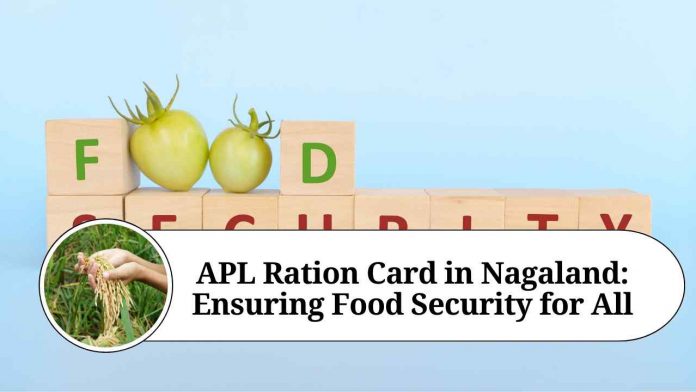Introduction
In Nagaland, a picturesque state in northeastern India known for its rich cultural heritage and breathtaking landscapes, the government has taken significant strides towards ensuring food security for its citizens. One of the key initiatives in this regard is the Above Poverty Line (APL) Ration Card system. This system plays a vital role in providing subsidized food grains and essential commodities to eligible households in the state. In this blog post, we will explore the APL Ration Card in Nagaland and its impact on the lives of its residents.
Understanding the APL Ration Card
The APL Ration Card is a government-issued identification document that serves as proof of eligibility for purchasing subsidized food grains and other essential commodities. It is designed to benefit households that fall above the poverty line but still require assistance in meeting their basic nutritional needs. The APL Ration Card is an essential tool in the implementation of the Public Distribution System (PDS) in Nagaland.
Benefits of the APL Ration Card
- Access to Subsidized Food Grains: The APL Ration Card enables eligible households to purchase food grains such as rice, wheat, and sugar at significantly lower prices. This ensures that even those above the poverty line can afford basic food necessities, reducing their financial burden.
- Nutritional Security: By availing the benefits of the APL Ration Card, families can have access to a regular supply of nutritious food items. This helps in addressing malnutrition and improving the overall health and well-being of individuals, especially vulnerable groups like children and the elderly.
- Financial Relief: With the availability of subsidized food grains, households can allocate their limited financial resources to other essential needs such as education, healthcare, and livelihood development. The APL Ration Card system acts as a safety net, freeing up resources that can be utilized for other purposes.
- Reduced Food Insecurity: Nagaland, like many other states in India, faces challenges related to food insecurity. The APL Ration Card system plays a crucial role in mitigating these issues by ensuring a consistent supply of affordable food grains. This helps in stabilizing food prices and reducing the risk of food shortages.
- Targeted Assistance: The APL Ration Card system allows the government to identify and assist households that are economically vulnerable but not classified as below the poverty line. By targeting this specific segment of the population, the government can provide support where it is most needed, ensuring a more equitable distribution of resources.
Implementation and Challenges
The implementation of the APL Ration Card system in Nagaland involves a coordinated effort between the state government, the Food and Civil Supplies Department, and the local administration. The process includes the identification of eligible households, issuance of the ration cards, and the establishment of fair price shops for the distribution of subsidized food grains.
However, like any large-scale program, the APL Ration Card system faces certain challenges. These include issues related to identification and verification of eligible households, efficient distribution mechanisms, and preventing misuse or fraud. The government must continuously work towards addressing these challenges to ensure the effective functioning of the system.
Conclusion
The APL Ration Card system in Nagaland is an integral part of the state’s efforts to achieve food security for all its residents. By providing subsidized food grains and essential commodities to households falling above the poverty line, the system helps alleviate the financial burden and ensure access to nutritious food. It plays a vital role in reducing food insecurity and improving the overall well-being of the population. While challenges exist, the continued commitment of the government towards addressing them will contribute to the success of the APL Ration Card system and the betterment of the lives of Nagaland’s citizens.
Read more useful content:
Frequently Asked Questions (FAQs)
Q1: What is an APL Ration Card in Nagaland?
A1: An Above Poverty Line (APL) Ration Card in Nagaland is a government-issued identification document that enables eligible households to purchase subsidized food grains and essential commodities. It is designed to assist households that fall above the poverty line but still require support in meeting their basic nutritional needs.
Q2: Who is eligible for an APL Ration Card in Nagaland?
A2: Any household in Nagaland that falls above the poverty line can apply for an APL Ration Card. The exact eligibility criteria may vary and are determined by the state government.
Q3: How can I apply for an APL Ration Card in Nagaland?
A3: To apply for an APL Ration Card in Nagaland, you need to visit the Food and Civil Supplies Department or the local administration office in your area. Obtain the application form, fill it out with the necessary details, and submit it along with the required documents, such as proof of residence, income certificate, and identification documents.
Q4: What are the benefits of holding an APL Ration Card?
A4: Holding an APL Ration Card in Nagaland provides several benefits, including access to subsidized food grains such as rice, wheat, and sugar at lower prices. It ensures nutritional security for eligible households and reduces the financial burden of purchasing essential food items. Additionally, it allows families to allocate their limited financial resources to other essential needs.
Q5: Can I use my APL Ration Card in any fair price shop?
A5: Yes, you can use your APL Ration Card in any fair price shop authorized by the government in Nagaland. These shops are designated to distribute subsidized food grains and essential commodities to APL Ration Cardholders.
Q6: How frequently can I purchase subsidized food grains with my APL Ration Card?
A6: The frequency of purchasing subsidized food grains with an APL Ration Card may vary. It depends on the specific guidelines and distribution schedule established by the Food and Civil Supplies Department in Nagaland.
Q7: Is there an expiration date for an APL Ration Card in Nagaland?
A7: Yes, APL Ration Cards in Nagaland have an expiration date. The validity period is typically mentioned on the card itself. It is essential to renew the card before it expires to continue availing the benefits.
Q8: Can I transfer my APL Ration Card from one district to another within Nagaland?
A8: Yes, it is possible to transfer your APL Ration Card from one district to another within Nagaland. You need to visit the Food and Civil Supplies Department or the local administration office in your new district and follow the required procedures for card transfer.
Q9: What should I do if my APL Ration Card is lost or damaged?
A9: In case your APL Ration Card is lost or damaged, you should immediately report it to the Food and Civil Supplies Department or the local administration office. They will guide you on the process of obtaining a duplicate card or getting it repaired.
Q10: Are there any restrictions on the usage of an APL Ration Card?
A10: The usage of an APL Ration Card is restricted to the purchase of subsidized food grains and essential commodities from fair price shops. It cannot be used for any other purposes or to avail benefits outside the designated system.




















